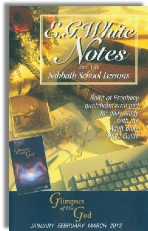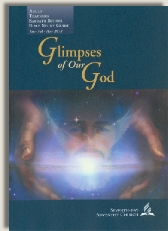|
||||||||||||||
Commentary on "The Triune God"
Day 2: Sunday, January 1, 2012 - The Oneness of God
Overview
Today's lesson discusses Deuteronomy 6:4, the verse known to Jews as "the Shema” (pronounced "sh-MA”). While titled "The Oneness of God,” the lesson attempts to explain that the "oneness” of God merely refers to a harmonious unity among multiple beings.
Observations
Today's lesson states the following:
“'Hear, O Israel: The Lord our God, the Lord is one' (Deut. 6:4, ESV). Compare that verse with Genesis 2:24 (ESV), 'Therefore a man shall leave his father and his mother and hold fast to his wife, and they shall become one flesh.' What might it mean that the same Hebrew word for one appears in both texts?
“The same word, echad, for 'one,' is used of God in the 'Shema' of Deuteronomy 6:4. This word echad, for oneness, does not imply a mathematical sum but a complex unity instead. Something is being affirmed here about a unity of distinct parts. Husbands and wives are to be 'one' (echad) according to Genesis 2:24, just as in Deuteronomy God is 'one.'”
And the Easy Reading Edition contains this paraphrase :"This word echad, meaning 'one,' does not suggest an actual number but a complete unity (harmony) of oneness instead.” (Parentheses in original.)
Before taking a look at the Hebrew word echad (pronounced "eh-KHAD”) and what it means, we must first take note of the fact that this lesson is actually doing away with the oneness of God. Instead of "The Oneness of God,” today's lesson could more accurately be titled "The Plurality of the Gods” (to borrow from the language of Mormon prophet Joseph Smith). Adventism tries to change God's oneness into a plurality. In Trinitarianism, God's oneness is not plural—He is actually and absolutely one. It's certainly not His oneness that is plural!
The author claims that the word "one” in Deuteronomy 6:4 "does not imply a mathematical sum but a complex unity instead.” Or, as the Easy Reading Edition puts it, "This word echad, meaning 'one,' does not suggest an actual number...” In other words, it does not tell us the actual number of Gods there are (one) but instead refers to a "complex unity”! This means that there is not just one actual God (as in an "actual number”), but that there could be any number of actual gods, as long as they are "united,” since the word "one” does not actually mean "one” and "does not suggest an actual number”! This teaching could be called a lot of things, but monotheism is certainly not one of them.
The author goes on to state that "God” is "a unity of distinct parts.” This is in direct opposition to the orthodox confessions of the Christian faith, which have always affirmed that God is "without body, parts, or passions.” Again, God is one simple (not complex) divine Being.
So what does the Hebrew word echad mean? Is it true that it "does not imply a mathematical sum but a complex unity instead” and that it "does not suggest an actual number”? The fact is that the word echad simply means "one”—it is simply the Hebrew equivalent of the English word "one,” and it is used nearly 1,000 times in the Old Testament. And just like the English word "one,” it can have a variety of uses, based on the context in which it is found. In fact, in order for it to have any meaning whatsoever in Genesis 2:24, it must first have the basic meaning of "one.” Their claims that the Hebrew word echad "does not imply a mathematical sum but a complex unity instead” and that it "does not suggest an actual number” can be proven false simply by looking at other usages of the word in the book of Genesis. Genesis 4:19 (NASB) says: "Lamech took to himself two wives: the name of the one [echad] was Adah, and the name of the other, Zillah.” Is this verse referring to Adah as a "complex unity" of an undetermined number of beings or as a "mathematical sum”/”actual number” of one? Genesis 10:25 (NASB) says that "the name of the one [echad] was Peleg”—again, was Peleg a "complex unity” of an undetermined number of beings or an "actual number” of one? Clearly, their assertions regarding the word echad are simply nonsensical.
When Adventism claims that God is "one” only in the sense that Adam and Eve were "one,” that is pure polytheism (despite their claims to the contrary). I believe even most Adventists would admit that if they were to worship Adam and Eve they would be polytheists, not monotheists!
The Teachers Edition, on page 13, says: "Just for Teachers: The Bible introduces us to a God who is One, a God characterized by echad, or unity. And yet, from the very beginning we also are presented with a picture of a multifaceted God.”
And yet, according to their definition, the echad/unity is a presentation of "a multifaceted God”!
The Teachers Edition even goes on to take their definition of echad a step further. On page 14, speaking of the ancient pagan gods, they say:
“As kings and priests gained power, they found it useful to gather these gods into pantheons that resembled a royal court of the time. These were unities of a sort, usually with one god who ruled over an uneasy collection of lesser deities with their own mutually exclusive agendas that reflected their diverse origins. But this was not the unity connoted by the Hebrew word echad, which could just as usefully be translated as harmony, a concept that definitely did not apply to ancient polytheism.
“The inspired writers of the Bible rejected this polytheism because they knew that God was One. But this oneness is not merely a number. It means that the God of the Bible is unique.”
Here we see the typical Adventist argument that their belief does not equal polytheism (or at least not "this polytheism”!) simply because their gods all get along with each other really well!
And they even go so far as to claim that echad could be translated as "harmony” instead of "one”! Thus, they would have Deuteronomy 6:4 read: "Hear, O Israel: The LORD our God, the LORD is harmony.” And if we were to apply this translation to Genesis 4:19, it would read: "Lamech took to himself two wives: the name of the harmony was Adah, and the name of the other, Zillah.”
Adventism's attempt to redefine the Shema as a statement of polytheism would make any orthodox Jewish rabbi outraged, and it takes away all of the force and meaning from the beginning of what Jesus calls the greatest commandment in the Law (Mark 12:29-30). God is indeed (an "actual number” of) one!
Summary
- The primary meaning of the Hebrew word echad is "one” (not "complex unity” or "harmony”), and in Deuteronomy 6:4 it does indeed mean "one.”
- God is not a "complex unity” of" distinct parts,”but is instead one indivisible/simple Being.
- Adventism has its own illogical set of mathematics, which says that 3 gods who fight with each other = 3 gods but that 3 gods who get along with each other = 1 god.
- The Adventist claim that the "oneness” of God is not a "mathematical sum” or an "actual number” and that God is "one” only in the sense that Adam and Eve were "one,” amounts to the heresy of polytheism (multiple divine beings/gods).
Copyright 2011 BibleStudiesForAdventists.com. All rights reserved. Revised December 29, 2011. This website is published by Life Assurance Ministries, Glendale, Arizona, USA, the publisher of Proclamation! Magazine. Contact email: BibleStudiesForAdventists@gmail.com.
The Sabbath School Bible Study Guide and the corresponding E.G. White Notes are published by Pacific Press Publishing Association, which is owned and operated by the Seventh-day Adventist church. The current quarter's editions are pictured above.
Official Adventist Resources
Standard Edition Study Guide Week 1
Teacher's Edition Study Guide Week 1
Easy Reading Edition Study Guide Wk 1
Search the Complete Published Ellen G. White Writings
Please Support This Project


